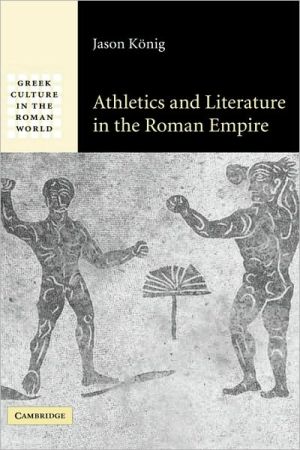

 |

|

The average rating for Athletics and Literature in the Roman Empire (Greek Culture in the Roman World Series) based on 2 reviews is 4.5 stars.
Review # 1 was written on 2013-06-01 00:00:00 Alan Hilton Alan HiltonAthletics and Literature in the Roman Empire examines the depiction of Greek athletics in the Imperial period. Konig combines a superb understanding of several important texts from Lucian, Dio Chrysosthom, Pausanias Galen and Philostratus with an impressive understanding of the physical and inscriptional evidence about Greek athletics in the early Imperial period. This combination allows Konig to compare and contrast the texts on which he focuses with how athletics worked, at least, according to non-literary sources. It is one of the reasons why this is a must-read book for those who are interested in Konig. Another reason why this book deserves to be read is that Konig represents an important approach to Greek athletics which is gaining ground, thankfully, in the understanding of Greek athletics; one which moves away from the attempts at physical reconstruction of Greek athletics. However useful those attempts have been in the past, Konig tries to deepen our understanding of the rhetorical and historical context of athletics. His studies compare the mulitple perspectives about athletics in an effort to understand its place in Graeco-Roman society. His findings are insightful, not just for athletic history, but for the cultural understanding of Greece and Rome in the principate. This book is written in a clear style, but the nature of the sources, which are not exactly commonly read, makes this, occasionally, a very dense read. It is well worth it, but greater familiarity with the sources examined is helpful. |
Review # 2 was written on 2014-11-05 00:00:00 James Brow James BrowHaving read a few other books analyzing the historical problems of Arthur, it is finally starting to make sense. This author hammers the idea that "history" must be read in the context of which it was written which in the case of early medieval Britain, was to shore up the immediate political and religious regimes. Sure, there may have been a Roman "Artorius" somehow attached to miraculous stones placed in the landscape and connected to some hunter legends ( Welsh "arth" being "bear") and this author leaves that very vague while still reminding us of Lucius Artorius Castorus leading cavalry on the border with the Picts and very specific landmarks in the upper Wye Valley of Wales. It's weird that those two would be connected for a writer in the 9th Century to come up with a warrior hero to shore up the kings of Gwynedd, but there we are. The book is well-written in an academic style with his references in parentheses in the text as you go along. And, yes, I do recognize a good number of them as my Arthurian collection is growing. I'm glad to have visited the landscape of Britain, even the upper Wye Valley and the remnants of Roman walls in the North to have even more understanding of these tantalizing threads. The book concludes with a concise historiography to bring us through the disturbing Anglo-Saxon racism of the Victorian era and early 2oth Century. Defeating German Nazism did that in, one would hope. But there is still no explanation for Boris Johnson which obviously is beyond the writing of this book. Pandemic and politics have left me somewhat discouraged in the present. If only there had been a Golden Age or the promise of a Once and Future King.... from the Upper Wye Valley or the Scottish Borders of my ancestors would be nice. |
CAN'T FIND WHAT YOU'RE LOOKING FOR? CLICK HERE!!!